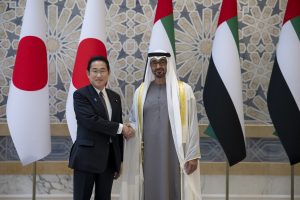Over a three-day period from July 16 to 18, Japanese Prime Minister Kishida Fumio paid visits to Saudi Arabia, the UAE, and Qatar. Typically, when Japanese leaders travel to the Middle East, their aim is to stabilize the energy supply, always a top priority given Japan’s heavy reliance on the region for oil and natural gas. However, Kishida’s visit was different. Indeed, it should be seen as historic, since it marks a major shift in Japan’s Middle East diplomacy, reflecting a keen sense of the drastically changing international situation and changes within the Middle East itself.
So what was Kishida’s goal? First, he wanted to help the region shift to a new economic structure to accommodate decarbonization. Japan aims to achieve carbon neutrality by 2050 and is developing policies to reduce its dependence on fossil fuel. Changing industrial structures will also force a transformation of the economies of the Gulf countries, which have long been reliant on fossil fuel exports. As such, on this visit Kishida was trying to position Japan to play a role in supporting Gulf countries in their efforts to achieve green transformation themselves.
The United Arab Emirates currently holds the presidency of the Conference of the Parties to the United Nations Framework Convention on Climate Change in 2024 (COP28). This has provoked some disquiet, given that UAE is an oil- and gas-producing country, but in fact Gulf countries are already moving toward the future. For instance, under the leadership of the influential Crown Prince Mohammed bin Salman, Saudi Arabia is pursuing an economic and social reform program called Saudi Vision 2030, in which it is beginning to prepare for the decarbonized era. Japan sees this trend as a business opportunity, and wants to not only collaborate in the production of hydrogen and ammonia using underground resources in the Middle East, but also to cooperate in areas such as producing materials that do not emit carbon dioxide during manufacturing. With this in mind, Kishida has used the visit to pursue a strategy of strengthening ties with the Middle East by linking Japanese technologies and investments with the future of the gulf countries.
A second aim of the visit is to provide the Gulf countries with the support they need to shift their economic structures away from fossil fuel exports. For the Gulf countries to transition to economies that are not dependent on fossil fuels, that will need to cultivate industries that take advantage of their high education levels, labor forces, and abundant solar resources. To help with this, Japan has signed bilateral agreements in areas such as semiconductors, space, medicine, education, agriculture and tourism. Helping the Gulf countries execute an industrial structure shift by making use of these advanced technologies is one area where Japanese companies can play a role, by offering advanced technological capabilities and develop new markets. Kishida was accompanied by heads of the traditional energy industry as well as space and healthcare companies, and more than 50 business-to-business agreements were signed over the three days. Moreover, negotiations to conclude a free trade agreement between Japan and the Gulf Cooperation Council (GCC) will begin in 2024, to provide further support for these corporate activities.
Third, the United States has been the main guarantor of the security order in the Middle East, but since the shale revolution in the U.S., not only has its dependence on the Middle East decreased, but the Trump administration’s America First policy and measures to improve relations between Arab countries and Israel, for instance through the Abraham Accords, have significantly changed the order in the Middle East. Meanwhile, the Chinese-mediated normalization of diplomatic relations between Saudi Arabia and Iran is progressing, and the Sino-Russian influence in the Middle East is increasing, as seen for instance in relations between Iran and Russia, which have strengthened following Russia’s invasion of Ukraine. With Japan becoming interested not only in a stable energy supply but also in the shift toward a decarbonized era, it seeks a stable situation to build a security environment and bilateral relations.
Japan also hopes to strengthen ties with the countries of the Global South from an economic security perspective, not only in terms of relations between Japan and GCC countries, but also that with the Organization of Islamic Cooperation, as a means to diversify the regional balance. Japan has by far the greatest soft power in the Middle East, thanks to things like anime and manga, but this has not translated into political influence. Nonetheless, Japan is trying to counter Sino-Russian advances by exerting influence in the region, the culture of which is dominated by Islam.
For Japan, then, relations with the Middle East will no longer be limited to energy policy, but will develop dynamically across a broad range of areas, from industrial cooperation to security. Kishida’s visit signaled a shift in Japanese Middle East diplomacy, as Japan seeks to bolster its presence as a geopolitical player in the region.
SUZUKI Kazuto is a professor at the University of Tokyo.

































